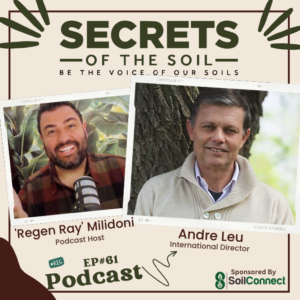We had an inspiring conversation with Luke Harrington from Regen Farming Solutions in our latest episode “Why Regenerative Farming is The Key Feeding The World”. Dive into the fascinating world of regenerative farming and its crucial role in our future food systems. Here are some key takeaways:
🔑 Key Takeaways:
1. Mindset Shift: Regenerative farming is more than just a set of practices—it’s a mindset. It emphasizes soil improvement, community well-being, and holistic decision-making over rigid certification or commercialization.
2. Soil Health Indicators: Simple changes like reducing urea and using natural biological stimulants can slowly but significantly improve soil health. Visual soil assessments and the presence of worms serve as reliable indicators of soil vitality.
3. Long-Term Vision: Regenerative practices not only boost profitability and farm productivity but also enhance water absorption and drought resilience. These changes ensure sustainable farming and a better future for all scales of operations, from backyard gardens to large-scale farms.
Tune in to hear more about how embracing regenerative farming can lead to healthier soils, communities, and ecosystems. 🎧✨
Who is Luke Harrington?
Re-gen Farming director and owner Luke Harrington has always been interested in biology and soil health, along with healthy food production. This passion has led Luke to invest in his own education to develop a diverse knowledge of the tools needed to increase the biological health of soil.
Having completed many different online, on-farm and face to face events, field days, webinars and courses Luke has developed a far reaching network of like-minded experts in soil function and health.
His passion for long term sustainable agriculture has seen Luke branch away from the traditional agricultural service industry to providing a consulting service for those looking to farm differently, or more in tune with nature.
From sourcing seeds, along with biological fertilisers and stimulants, Luke can support farmers with long term planning and grazing management options. Luke can help unlock the tools in the toolbox to reinvigorate the biology in your soil to improve soil health, plant health, farm health and profit health.
Based in Deniliquin in Southern NSW, Luke spends time on the road and via Zoom supporting farms to transition to long term sustainable farming practices.

The farmland is teeming with untapped potential waiting to be unleashed through the principles of regenerative farming. Episode 45 of “Secrets of the Soil” delves into this topic, featuring an enlightening discussion between host ‘Regen Ray’ Milidoni and Luke Harrington of Regen Farming Solutions. They passionately unpack how a shift in mindset, grounded in simplicity and community well-being, can drive a revolution in how we treat our soil and grow our food.
The Missing Link: Learning from the Past
Reflecting on the "Green Revolution
The conversation kicks off with host Regen Ray reflecting on the “Green Revolution,” which introduced high-yielding varieties of crops in the mid-20th century. While it initially seemed like a solution to global hunger, it came with unintended consequences. Chemical inputs, monocultures, and overlooked soil health started revealing cracks in this approach. Ray stresses the importance of acknowledging these mistakes to pave the way for better, more sustainable practices.
Embracing Failures as Stepping Stones
Luke Harrington joins in, asserting that the failures of the past are not necessarily setbacks but opportunities for growth and improvement. By understanding where we went wrong, we can adopt a decision-making framework focused on regenerating soil and ensuring community well-being.
Redefining Farming: The Essence of Regenerative Agriculture
A Thought Process, Not a Certification
Luke passionately defines regenerative farming as more than a set of practices; it’s a thought process. It revolves around improving soil health and promoting the well-being of communities and families. Both Luke and Ray emphasize that this approach is not about rigid certifications but about embracing a mindset shift. A farmer doesn’t need commercial labels to validate their methods; they need a genuine process for creating healthier soils and ecosystems.
Practical Applications: From Soil Health to Personal Growth
Interconnected Growth
An insightful highlight of the episode is the notion that the health of the land and personal growth are interconnected. This stems from a belief that sustainable farming practices contribute to the resilience and richness of farming communities. Both speakers underscore that improving soil health can inadvertently foster personal well-being and financial profitability.
Farmers as Custodians
Farmers hold the key to our food and fiber production—they’re the custodians of the land. Regenerative farming practices not only help handle extreme weather conditions like droughts and floods but also improve the soil’s capacity to absorb water, mitigating these impacts.
Simple Yet Profound: Essential Practices in Regenerative Farming
Minimal Input, Maximum Benefit
Harrington explains that regenerative farming does not necessitate the abandonment of conventional tools; rather, it offers additional resources to boost soil health. Simple changes like reducing the use of urea and relying on natural products can stimulate soil’s biological systems, leading to slow yet substantial improvements within a span of 3 to 5 years.
The Bigger Picture: The Microbiome and Nutrient Density
Soil, Plants, and Human Health
A riveting part of the discussion is the intricate link between the soil microbiome and overall ecosystem health, extending even to human physical and mental well-being. Harrington likens worms to the “canary in the coal mine” for soil health, suggesting that visual assessments can be as critical as scientific tests.
Nutrient Density and Chemical-Free Farming
Luke elaborates on the potential benefits of testing nutrient density and chemical-free farming practices. This can significantly improve human health and create a more inclusive market for healthier products. He emphasizes a collective effort is needed in agricultural systems to develop and validate these practices.
Reimagining the Water Cycle
Revitalizing Local Water Cycles
Capturing the essence of regenerative farming involves rethinking local water cycles. By focusing on keeping plants green and capturing dew instead of leaving soil bare, we can enhance water availability and promote ecological improvements like increased wildlife and biodiversity.
Consumer Trust and Education
Navigating Certifications and Labels
Consumer trust in agricultural certifications and labels is another pivotal topic. The speakers stress the importance of consumer education and awareness, advocating for transparency and the ability to distinguish marketing tactics from genuine practices.
Advocating for Sensory Assessment
The discussion also branches into the realm of sensory assessment. Milidoni notes that the flavor and smell of produce can be telling indicators of soil and crop health, as illustrated by Harrington’s experience of biologically-grown oats tasting sweeter compared to their conventionally-grown counterparts.
Toward a Regenerative Future
A Passionate Call to Action
Luke and Ray share their excitement and frustration over the slow yet growing mainstream interest in regenerative farming. The episode concludes with a call to action: for more people to engage deeply with soil care. Passionate support and widespread education can drive a seismic shift in our agricultural practices, ultimately leading us to a healthier planet and populace.
In closing, the episode resounds with a clear message: regenerative farming is a time-proven philosophy that requires a shift in both mindset and practice, embracing simplicity, interconnectedness, and the sanctity of our soil ecosystems. The future of farming is not just in growing plants but in nurturing the very soil that sustains life.






